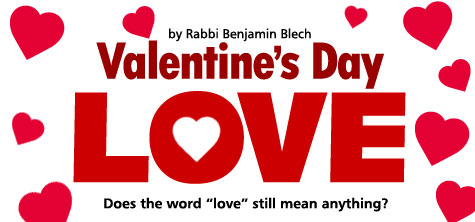 Iran’s Attack on Israel
Iran’s Attack on Israel


5 min read
Does the word “love” still mean anything?
Are you in love?
Millions of people will take advantage of Valentine’s Day to affirm their strong feeling of affection with the three words “I love you.” That statement has been called the most beautiful phrase in the English language.
Love after all supposedly signifies the strongest bond possible between two people. Love is nothing less, as the Zohar puts it, than "the secret of divine unity."
The word love seems to have lost its meaning, suffering from what I call verbal inflation.
What troubles me though is that in our day, the word love seems to have lost its meaning, suffering from what I call verbal inflation.
We all know what inflation can do to money. If the government prints too much of it, that reduces the value of all the currency already in circulation. Verbal inflation is what happens when we use words that start out having considerable value for cheap imitations. Before long, million-dollar words can no longer be taken seriously. They identify every worthless item as a priceless heirloom. They allow junk to masquerade as jewels and trivia to be confused with treasure.
Stan Carey of Macmillan Dictionary publishers recently complained about how much language inflation ultimately creates devaluation in meaning. To call someone brilliant today is merely to suggest that he is somewhat clever. To proclaim a film a masterpiece is to allow that one can sit through it without too much fidgeting. Everyone with some talent is hailed as a “genius” (and anyone funny becomes a “comic genius”),
Carey explains, “Such is our need to imbue our words with force and significance, that we use hyperbole to entice people to pay attention – and the hyperbolic terms gradually normalize.”
C.S. Lewis wisely warned against language inflation: “Don’t use words too big for the subject. Don’t say infinitely when you mean very; otherwise, you’ll have no word left when you want to talk about something really infinite.”
And this is precisely where we find ourselves right now. We have no words left when we want to say that something truly is awe-inspiring or full of wonder.
No surprise then that in the age of Facebook almost everyone has hundreds of friends. The French essayist Montaigne thought that a person should consider himself extremely blessed if during his lifetime he manages to find one true friend. That’s because the word friend - not acquaintance, colleague, business associate, member of the same club, coworker or neighbor – was once imbued with the kind of connotation it was meant to have before becoming diminished by reckless overuse and inflation. Tragically enough, no other word was then found to replace it.
Which brings me back to love.
In today’s world, the word love has become so commonplace that we use it to describe our feelings for favorite foods, most sought after fashions, and our fascination for the latest technological wizardry brought out by Apple. Writer George Englund recently said that the word love is now so meaningless that “it ought to be taken out behind the woodshed and shot.”
For the Bible, the word love was sacred. Each time it appears it is part of a commandment.
We are to love God. But the Torah is not content to leave it at that without further explanation. “And you shall love the Lord your God with all your heart, and with all your soul and with all your might.” Love means total commitment. Love means fidelity. Love means being willing to give up your very life for the one to whom you profess this passion
We are to love our neighbor. But that means nothing unless we define the extent of this obligation. “Love your neighbor as yourself.” My neighbor shares the divine image that makes me unique. He or she, like me, is a child of God. That is why my concern for my neighbor must be comparable to my concern for myself.
Biblical love commanded by God is light years from its contemporary usage by a chocoholic who tells us he loves Godiva. How sad that language resists our effort to give expression to its unique import.
I remember reading that the Eskimos have 52 different words for snow because it is so important to them. They require every one of these descriptives in order to take note of all the fine distinctions between these different blessings from the sky. If only there were at least as many different words for love, so that lovers can accurately share their profound feelings for each other.
Without that, however, I can only make a modest proposal on the eve of Valentine’s Day: If you’re going to say “I love you,” let it be with a commitment to the kind of love the Torah deemed ideal before verbal inflation debased it - with all your heart, with all your soul, and with all your might.
